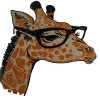Jack of all trades, master of none, other than materials engineering. Managed to get a master's in that. I make documentaries too.
Cishet dude - he/they
#ADHD (probably #ActuallyAutistic)
#Humanist, not humanitarian
Proud #AntiFascist
#Videography : Semi-pro
I have a #documentary crew. I do #colorgrading, #postproduction
#Music : amateur
#WaterColors : noob
Header:None Avatar: marker drawn portrait of a giraffe with glasses
This profile is from a federated server and may be incomplete. Browse more on the original instance.
